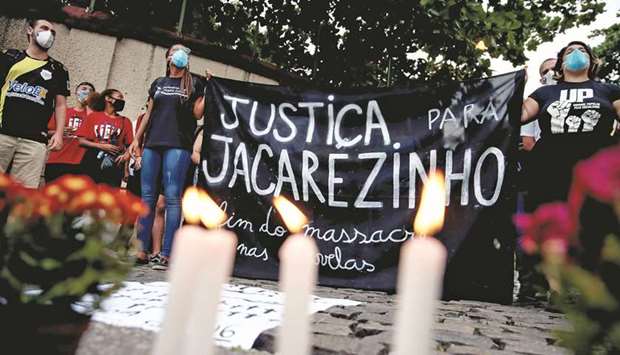Police in Brazil faced outrage and a UN call for an investigation yesterday after a raid on a Rio de Janeiro favela left 25 people dead – some reportedly killed in cold blood.
“Stop killing us!” said hundreds of protesters from the impoverished neighbourhood of Jacarezinho, who marched outside police headquarters accusing officers of perpetrating a “massacre”.
“This is one of the most barbaric acts in the history of the Rio police,” student Roger Denis told AFP. “We’re here to ask for justice for this unjustifiable massacre.”
It was one of several protests planned against Thursday’s police operation, which rights groups said was the deadliest ever in a city all too used to violence and police killings, particularly in the poor, majority-black favelas, or slums.
Police said the operation targeted a drug gang that was recruiting children and teenagers.
It turned the northern neighbourhood into a war zone on Thursday morning, leaving streets strewn with corpses and pools of blood.
One of the dead was a police officer shot in the head, whose funeral yesterday afternoon drew emotional tributes from colleagues, as well as security hawks such as President Jair Bolsonaro and his inner circle.
The other 24 dead were “criminals”, according to police – who now face mounting calls to prove that, as well as questions on why they were killed rather than arrested.
United Nations rights office spokesman Rupert Colville told reporters in Geneva that his office was “deeply disturbed” by the killings, and called for prosecutors to open an “independent, thorough and impartial investigation”.
“We remind the Brazilian authorities that the use of force should be applied only when strictly necessary,” he said. “Lethal force should be used as a last resort.”
“The number of people killed in this police operation is reprehensible, as is the fact that, once again, this massacre took place in a favela,” said Jurema Werneck, executive director of Amnesty International Brazil, referring to the informally-organised neighbourhood with few public services.
A 2005 raid in the Baixada Fluminense in Rio’s violent northern outskirts killed 29 people.
“This is one of the largest death tolls in a police operation in Rio, surpassing 19 at Complexo do Alemão slum in 2007, except we did not lose one of ours then,” police chief Ronaldo Oliveira told Reuters.
Human Rights Watch (HRW) said that Rio de Janeiro prosecutors have a constitutional obligation to oversee the police and pursue criminal investigations of police abuses.
It called for a thorough and independent investigation into the deaths.
According to HRW, Rio police killed 453 people and at least four police officers died in police actions during the first three months of the year, despite a Supreme Court ruling prohibiting operations in communities during the coronavirus (Covid-19) pandemic except in “absolutely exceptional cases”.
Police said in addition to drug trafficking, the gang robbed trucks of cargo and held up commuter trains to steal from passengers.
Residents described a heavy firefight, and aerial TV footage from the raid showed armed men on rooftops passing what looked like high-powered rifles from hand to hand.
Police said that the officers had followed all protocols before opening fire, and displayed large piles of drugs and guns seized in the operation, including six assault rifles, 15 handguns, a machine gun, 14 grenades and a round of artillery ammunition.
However, accounts from witnesses, relatives and video posted on social media raised doubts.
One resident told AFP that a wounded young man fled into her home, only for police to follow his blood tracks up the stairs to her second-floor apartment.
“I just had time to pull my children behind me before they murdered him,” she said. “They didn’t even give him time to say anything.”
Another resident told news site UOL that her husband, 32-year-old Jonas do Carmo dos Santos, had gone out to buy bread when police shot him at point-blank range.
Dos Santos, who worked in construction and at a pizzeria, was not involved in crime, she said.
Witnesses told her that he was wounded in the leg when police opened fire in an alley crowded with people trying to flee.
Then police “came right up to him and executed him”, she said. “It was an execution. They came to kill.”
He left behind a newborn son, she said.
Bolsonaro’s camp was quick to rally around the police.
The far-right president won office in 2018 on a pro-gun, pro-security platform, and has close ties with the police and military.
“They were all bad guys,” said Vice-President Hamilton Mourao, an army general, referring to the 24 killed.
Bolsonaro’s son Eduardo, a congressman, criticised “bums” who questioned the police.
“There’s a police officer murdered, and they defend the murderers,” he wrote on Twitter.
Rio, an iconic beach city of 6.7mn people, is notorious for its violent crime, and also a troubled history of police killings.
Last year, 1,245 people were killed by police in Rio de Janeiro state – more, for example, than the 1,127 such cases across the entire United States.
Experts questioned why the authorities continue a highly-militarised strategy against organised crime that has produced decades of high death tolls and few results.
“When the police leave, the gangs aren’t weaker. The traffickers just get more guns and come back more powerful than before,” said Silvia Ramos, head of the Security Observatory at Candido Mendes University. “Then the police return shooting even more, leaving the population even more traumatised.”

People attend a protest against police violence, outside the Jacarezinho slum, following a police operation that resulted in 25 deaths in Rio de Janeiro. The banner reads ‘Justice for Jacarezinho’.
